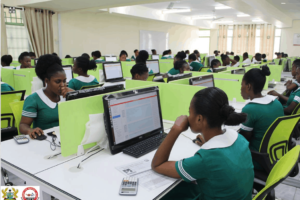
Madam Abena is primigravida with 24 weeks amenorrhoea. She has never attended antenatal clinic.
- Describe how she would be received at the antenatal clinic and the procedure she would be taken through during pregnancy.
ANSWER
Reception at the Antenatal Clinic:
- Warm Welcome and Orientation:
Madam Abena will be greeted respectfully and made to feel comfortable.
Maintain dignity and provide privacy for Madam Abena
The nurse will explain the purpose of antenatal care and why regular visits are important for both her and the baby.
2. Registration:
Her biodata (name, age, marital status, occupation, address, and next of kin) will be recorded.
A folder and antenatal care (ANC) card will be issued.
3. Comprehensive History Taking:
Obstetric history (since this is her first pregnancy, she is G1P0).
Medical history (any chronic illnesses like hypertension, diabetes, sickle cell disease).
Surgical history (any previous surgeries, especially abdominal or pelvic).
Social history (diet, lifestyle, alcohol, smoking, domestic situation).
Family history (genetic conditions, twins, diabetes, etc.).
4. Physical Examination:
General examination: check for pallor, jaundice, oedema, body temperature, pulse, respiratory rate.
Weight and height: used to calculate BMI.
Blood pressure: to detect early signs of pre-eclampsia.
Abdominal examination:
- Measure fundal height (should correspond to 24 weeks).
- Palpate foetal parts and listen for foetal heartbeat using a fetoscope or Doppler.
- 5. Laboratory Investigations:
Urine test: for protein (pre-eclampsia), sugar (gestational diabetes), and signs of UTI.
Haemoglobin level: to check for anaemia.
Blood group and Rh factor: to prepare for delivery and prevent Rh incompatibility issues.
HIV screening: for prevention of mother-to-child transmission.
Syphilis (VDRL test): to detect and treat early.
Hepatitis B and sometimes malaria parasites (depending on region).
Stool examination: for parasites like hookworm.
6. Tetanus Immunization:
She will receive Tetanus Toxoid Injection (TT1) on first visit.
Follow-up doses will be scheduled as per national immunization guidelines.
7. Medications and Supplements:
Folic acid (400–800 mcg daily): to prevent neural tube defects.
Ferrous sulphate (Iron): to prevent/treat anaemia.
Multivitamins: for general wellbeing.
Malaria prophylaxis: such as Sulfadoxine-Pyrimethamine (SP) if applicable.
8. Health Education and Counselling:
Importance of regular ANC visits.
Balanced diet and hydration.
Personal hygiene and rest.
Danger signs in pregnancy (e.g., vaginal bleeding, severe headaches, swelling, reduced foetal movement).
Birth preparedness and complication readiness (BPCR).
Family planning counselling for postpartum.
Exclusive breastfeeding advice.
9. Scheduling Future Visits:
Visits are scheduled based on gestational age:
- Every 4 weeks until 28 weeks
- Every 2 weeks from 28–36 weeks
- Weekly after 36 weeks until delivery
b. List Four (4) items for the baby that she will bring to the hospital when in labour:
- Baby clothes: 2–3 clean sets of clothing (vests, rompers, gown).
- Baby towel or receiving blanket: for warmth and drying the baby.
- Disposable or cloth diapers/nappies: for hygiene.
- Baby cap, mittens and socks: to protect from cold and maintain temperature.
(Optional items may include feeding bottles if not exclusively breastfeeding, and baby soap/oil)
c. List Six (6) items she will bring for herself:
- Personal clothing: loose gown, wrapper, nightdress, underwear.
- Sanitary pads/maternity pads: for postnatal bleeding (lochia).
- Toiletries: soap, sponge, towel, toothbrush, toothpaste, sanitary wipes.
- Plastic or rubber sheet: to protect the bed during delivery.
- Cup, spoon, plate: for eating and drinking during hospital stay.
- ANC card and ID: essential for follow-up, identification, and record verification.
(Optional: footwear/slippers, warm water flask, partner’s contact details)